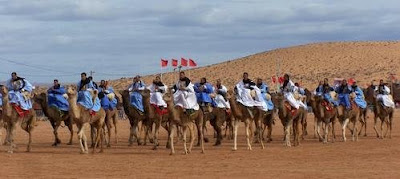 The development model adopted by Morocco in the southern provinces attaches utmost importance to safeguarding the cultural and civilizational aspects of the Sahara as part of a national undertaking aiming at preserving all the constituents of Moroccan identity, said King Mohammed VI in a speech to the nation marking the 42nd anniversary of the Green March.
The development model adopted by Morocco in the southern provinces attaches utmost importance to safeguarding the cultural and civilizational aspects of the Sahara as part of a national undertaking aiming at preserving all the constituents of Moroccan identity, said King Mohammed VI in a speech to the nation marking the 42nd anniversary of the Green March.
The development model, which was ushered by late King Hassan II to bridge the gap between the southern provinces and other Moroccan regions, was bolstered under the reign of King Mohammed VI with large-scale projects in the economic, social and cultural fields.
“This development model is not just about the economy. It is an integrated societal project aimed at ensuring human fulfilment, preserving people’s dignity and making sure man is front and center in the development process,” said the King in the speech.
He went on to say that “this model lays special emphasis on the preservation of the Saharan cultural heritage. I know personally how much that heritage means to the people of the region.”
Therefore, the king said that he cares deeply about the Hassani culture, which stands for the culture of the southern provinces.
The King also stressed that the Saharan culture needs to be showcased properly “by providing the cultural amenities and facilities required, promoting artistic initiatives and events, and honoring the men and women involved in culture, creativity and the arts.”
The promotion of the culture of the Sahara is part of an endeavor to promoting all components of the Moroccan identity, said the king, adding that “there is no difference between any of the cultural and linguistic characteristics across Morocco’s regions – in the Sahara or the Sousse region, in the Rif region, the Atlas mountains or the eastern part of the country.”
The King also deemed that preserving local cultural heritage “does not mean promoting intolerance or reclusiveness, nor should it be a pretext to foster extremism or separatism.”
“Rather, promoting the local heritage is a means whereby we show how proud we are of our cultural diversity and of all the components of our national identity, in a country which fosters unity among its regions,” he said.
Therefore, showcasing and preserving the national cultural heritage is a “collective duty” aiming at promoting communication and interplay between the constituents of this heritage while being open to universal values, to other civilizations and to the knowledge and communication-based world, the king underscored.


